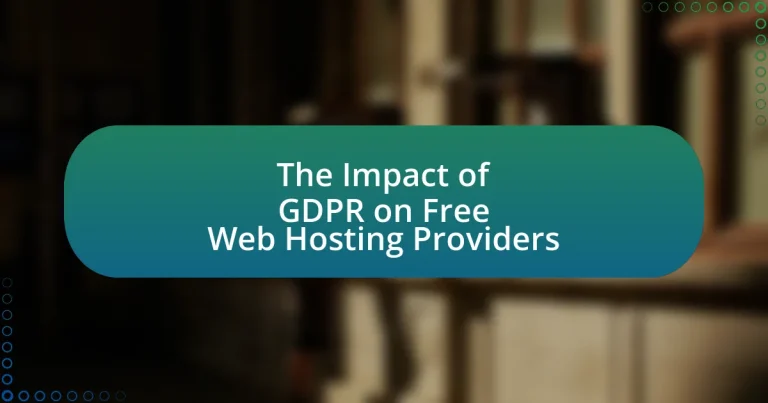The General Data Protection Regulation (GDPR) is a significant data protection law enacted by the European Union that affects how personal data is handled by free web hosting providers. This article examines the implications of GDPR for these providers, emphasizing the necessity for compliance in areas such as data protection measures, user consent, and transparency in data usage. It outlines the definition of personal data under GDPR, the principles that govern data processing, and the potential consequences of non-compliance, including substantial fines and reputational damage. Additionally, the article discusses the challenges faced by free web hosting providers in meeting GDPR requirements and offers best practices for ensuring compliance.

What is the GDPR and its relevance to free web hosting providers?
The General Data Protection Regulation (GDPR) is a comprehensive data protection law enacted by the European Union that governs how personal data of individuals within the EU can be collected, processed, and stored. Its relevance to free web hosting providers lies in the fact that these providers often handle personal data of users, making them subject to GDPR compliance requirements. Free web hosting services must ensure that they implement appropriate data protection measures, obtain user consent for data processing, and provide transparency regarding data usage. Failure to comply with GDPR can result in significant fines, which can reach up to 4% of a company’s global annual revenue or €20 million, whichever is higher, thus emphasizing the critical need for free web hosting providers to adhere to these regulations.
How does the GDPR define personal data?
The GDPR defines personal data as any information relating to an identified or identifiable natural person. This includes data such as names, identification numbers, location data, and online identifiers, which can directly or indirectly identify an individual. The regulation emphasizes that personal data encompasses a wide range of information, reflecting the importance of protecting individuals’ privacy rights in various contexts, including digital environments.
What types of data are considered personal under the GDPR?
Personal data under the GDPR includes any information that relates to an identified or identifiable natural person. This encompasses a wide range of data types, such as names, identification numbers, location data, online identifiers, and other factors specific to the physical, physiological, genetic, mental, economic, cultural, or social identity of that person. The GDPR defines personal data broadly to ensure comprehensive protection, as stated in Article 4(1) of the regulation.
How does the definition of personal data impact free web hosting providers?
The definition of personal data significantly impacts free web hosting providers by imposing strict compliance requirements under GDPR. Free web hosting providers often collect user information, which can include personal data such as names, email addresses, and IP addresses. Under GDPR, personal data is defined as any information relating to an identified or identifiable natural person, which means that free web hosting providers must implement robust data protection measures to ensure compliance. Failure to comply can result in substantial fines, as seen in cases where companies have been penalized for inadequate data protection practices. For instance, in 2020, a major fine was imposed on a company for mishandling personal data, highlighting the financial risks associated with non-compliance. Thus, the definition of personal data necessitates that free web hosting providers adopt stringent data handling and privacy policies to avoid legal repercussions.
What are the main principles of the GDPR?
The main principles of the GDPR are lawfulness, fairness, and transparency; purpose limitation; data minimization; accuracy; storage limitation; integrity and confidentiality; and accountability. These principles guide the processing of personal data, ensuring that individuals’ rights are protected. For instance, the principle of lawfulness requires that data processing is based on a legal basis, such as consent or contractual necessity, while purpose limitation mandates that data is collected for specified, legitimate purposes and not further processed in a manner incompatible with those purposes. Each principle is designed to enhance individuals’ control over their personal data and to promote responsible data handling practices by organizations.
How do these principles apply to free web hosting services?
The principles of GDPR apply to free web hosting services by mandating that these providers ensure the protection of personal data of their users. Free web hosting services often collect and process personal data, such as email addresses and IP addresses, which makes them subject to GDPR regulations. For instance, they must obtain explicit consent from users before processing their data and provide clear information about how that data will be used. Additionally, free web hosting services are required to implement appropriate security measures to protect personal data and must notify users of any data breaches within 72 hours, as stipulated by GDPR. Failure to comply can result in significant fines, reinforcing the necessity for these services to adhere to GDPR principles.
What obligations do free web hosting providers have under these principles?
Free web hosting providers are obligated to comply with the General Data Protection Regulation (GDPR) principles, which include ensuring the protection of personal data, obtaining user consent, and providing transparency regarding data processing activities. These obligations require providers to implement appropriate technical and organizational measures to safeguard personal data against unauthorized access and breaches. Additionally, they must inform users about their data rights, such as the right to access, rectify, or delete their personal information. Compliance with GDPR is essential, as failure to adhere to these principles can result in significant fines, which can reach up to 4% of annual global turnover or €20 million, whichever is higher.
What are the potential consequences for free web hosting providers failing to comply with GDPR?
Free web hosting providers that fail to comply with GDPR may face significant financial penalties, including fines up to €20 million or 4% of their annual global turnover, whichever is higher. Non-compliance can also lead to legal actions from affected individuals or regulatory bodies, resulting in costly litigation and potential compensation claims. Additionally, these providers risk reputational damage, which can lead to loss of customers and decreased trust in their services. The European Data Protection Board emphasizes that enforcement actions can be taken against any entity that processes personal data without adhering to GDPR standards, underscoring the importance of compliance for all web hosting services.
What types of penalties can be imposed for non-compliance?
Penalties for non-compliance with GDPR can include administrative fines, which can reach up to 20 million euros or 4% of the total worldwide annual turnover, whichever is higher. Additionally, non-compliance may result in corrective measures mandated by supervisory authorities, such as orders to cease processing personal data or to rectify data handling practices. These penalties are enforced to ensure adherence to data protection regulations, reflecting the seriousness of GDPR compliance in the context of free web hosting providers.
How can non-compliance affect the reputation of free web hosting providers?
Non-compliance with regulations such as GDPR can severely damage the reputation of free web hosting providers. When these providers fail to adhere to data protection laws, they risk public backlash, loss of user trust, and potential legal penalties. For instance, a study by the European Commission indicated that 60% of consumers are less likely to use services from companies that have faced data breaches or non-compliance issues. This negative perception can lead to decreased user engagement and a decline in new customer acquisition, ultimately harming the provider’s market position.

How has GDPR changed the landscape for free web hosting providers?
GDPR has significantly altered the landscape for free web hosting providers by imposing strict data protection regulations that require these services to ensure user privacy and data security. As a result, many free web hosting providers have had to implement comprehensive compliance measures, including obtaining explicit consent from users for data processing and enhancing their data management practices. For instance, the requirement for transparency in data usage has led providers to revise their privacy policies and user agreements, making them clearer and more accessible. Additionally, the potential for hefty fines—up to 4% of annual global turnover or €20 million, whichever is higher—has prompted many providers to reassess their business models, often leading to a reduction in free offerings or the introduction of paid tiers that guarantee better compliance and security features.
What adjustments have free web hosting providers made to comply with GDPR?
Free web hosting providers have implemented several adjustments to comply with GDPR, including enhancing data protection measures, updating privacy policies, and ensuring user consent for data processing. These providers have adopted encryption protocols to secure user data and have established clear guidelines for data retention and deletion. Additionally, they have revised their terms of service to explicitly inform users about their rights under GDPR, such as the right to access, rectify, or erase personal data. These changes are essential for compliance, as GDPR mandates strict regulations on how personal data is collected, processed, and stored, impacting the operational practices of free web hosting services.
What specific policies or practices have been implemented?
Free web hosting providers have implemented several specific policies and practices to comply with the General Data Protection Regulation (GDPR). These include the establishment of clear privacy policies that outline data collection, usage, and storage practices, ensuring transparency for users. Additionally, many providers have adopted data encryption methods to protect user information and implemented user consent mechanisms to obtain explicit permission for data processing activities. Furthermore, regular audits and assessments of data handling practices have been instituted to ensure ongoing compliance with GDPR requirements. These measures are essential for safeguarding user data and maintaining trust in the services offered by free web hosting providers.
How have these changes affected the services offered by free web hosting providers?
The changes brought about by GDPR have significantly limited the services offered by free web hosting providers. These providers now face stricter regulations regarding data protection and user privacy, which has led to a reduction in features such as unlimited storage and bandwidth, as they must allocate resources to ensure compliance with GDPR requirements. For instance, many free web hosting services have implemented stricter data retention policies and reduced the amount of personal data they collect from users to avoid potential fines, which can reach up to 4% of annual global turnover. This shift has resulted in a more cautious approach to service offerings, often leading to a decrease in the overall attractiveness of free hosting options for users seeking robust features.
What challenges do free web hosting providers face in GDPR compliance?
Free web hosting providers face significant challenges in GDPR compliance primarily due to limited resources and lack of control over user data. These providers often operate on tight budgets, which restricts their ability to implement necessary data protection measures, such as encryption and secure data storage. Additionally, many free hosting services rely on third-party services for data processing, complicating their ability to ensure compliance with GDPR requirements regarding data processing agreements and user consent. The European Data Protection Board emphasizes that all entities handling personal data, regardless of their business model, must adhere to GDPR, which places further pressure on free providers to meet these stringent regulations despite their operational constraints.
How do resource limitations impact compliance efforts?
Resource limitations significantly hinder compliance efforts by restricting the ability of organizations to implement necessary policies and technologies. For instance, free web hosting providers often lack the financial and human resources to invest in robust data protection measures required by GDPR, such as encryption and regular audits. This limitation can lead to inadequate data handling practices, increasing the risk of non-compliance and potential fines, which can reach up to 4% of annual global turnover or €20 million, whichever is higher, as stipulated by GDPR regulations. Consequently, the inability to allocate sufficient resources directly correlates with a higher likelihood of compliance failures.
What technical challenges arise in ensuring data protection?
Ensuring data protection presents several technical challenges, including data encryption, secure data storage, and compliance with regulations like GDPR. Data encryption is essential to protect sensitive information from unauthorized access, yet implementing robust encryption methods can be complex and resource-intensive. Secure data storage requires advanced infrastructure to prevent data breaches, which can be particularly challenging for free web hosting providers with limited resources. Additionally, compliance with GDPR mandates strict data handling practices, necessitating continuous monitoring and updates to systems, which can strain technical capabilities. These challenges highlight the intricate balance between providing accessible services and maintaining stringent data protection standards.

What best practices can free web hosting providers adopt to ensure GDPR compliance?
Free web hosting providers can ensure GDPR compliance by implementing robust data protection measures, including obtaining explicit consent from users before collecting personal data. This practice aligns with Article 6 of the GDPR, which mandates that personal data must be processed lawfully, fairly, and transparently. Additionally, providers should establish clear privacy policies that outline how user data is collected, used, and stored, ensuring that these policies are easily accessible and understandable.
Regular data audits and risk assessments can help identify potential vulnerabilities in data handling practices, allowing providers to mitigate risks effectively. Furthermore, implementing data encryption and secure access controls protects user data from unauthorized access, which is crucial for compliance with GDPR’s security requirements.
Lastly, free web hosting providers should ensure that they have data processing agreements in place with any third-party services they utilize, as stipulated in Article 28 of the GDPR, to ensure that all parties involved in data processing adhere to the same compliance standards.
How can free web hosting providers effectively manage user consent?
Free web hosting providers can effectively manage user consent by implementing clear and transparent consent mechanisms that comply with GDPR requirements. This includes providing users with explicit options to opt-in for data processing, ensuring that consent is informed and specific to the purposes of data collection. Additionally, these providers should maintain detailed records of user consent and offer easy access for users to withdraw their consent at any time. According to GDPR Article 7, consent must be demonstrable, meaning that providers must be able to show how and when consent was obtained, reinforcing the importance of proper consent management practices.
What strategies can be employed to obtain and document consent?
To obtain and document consent effectively, organizations should implement clear and transparent consent forms that outline the purpose of data collection, the types of data being collected, and the rights of the individuals involved. This approach aligns with GDPR requirements, which mandate that consent must be informed, specific, and unambiguous.
Additionally, organizations can utilize digital consent management tools that log consent timestamps and user interactions, ensuring that documentation is easily accessible and verifiable. According to the GDPR guidelines, maintaining records of consent is crucial for demonstrating compliance, as it allows organizations to provide evidence of consent if required by regulatory authorities.
How can providers ensure users are informed about their data rights?
Providers can ensure users are informed about their data rights by implementing clear and accessible privacy policies that outline these rights. These policies should be prominently displayed on their websites and communicated during the onboarding process. According to the General Data Protection Regulation (GDPR), users have specific rights, including the right to access, rectify, and erase their personal data. By providing detailed information about these rights and how users can exercise them, providers can enhance transparency and compliance. Additionally, regular training for staff on data rights and user communication can further reinforce this commitment to user awareness.
What tools and resources are available for free web hosting providers to aid in GDPR compliance?
Free web hosting providers can utilize several tools and resources to aid in GDPR compliance, including privacy policy generators, consent management platforms, and data protection impact assessment templates. Privacy policy generators, such as TermsFeed and Iubenda, help create GDPR-compliant privacy policies tailored to the specific services offered. Consent management platforms like Cookiebot and OneTrust assist in managing user consent for data collection and cookies, ensuring that users are informed and can opt-in or opt-out as required by GDPR. Additionally, data protection impact assessment templates provide a structured approach for identifying and mitigating risks associated with personal data processing, which is essential for compliance. These resources collectively support free web hosting providers in adhering to GDPR regulations effectively.
What software solutions can assist in data protection and compliance tracking?
Software solutions that assist in data protection and compliance tracking include tools like OneTrust, TrustArc, and Vanta. OneTrust provides comprehensive privacy management software that helps organizations comply with GDPR by automating data mapping and risk assessments. TrustArc offers a platform for managing privacy compliance and risk, enabling businesses to track their data protection efforts effectively. Vanta specializes in automating security and compliance processes, ensuring that companies meet regulatory requirements efficiently. These solutions are validated by their widespread adoption among organizations seeking to enhance their data protection strategies and maintain compliance with regulations like GDPR.
How can free web hosting providers leverage external expertise for GDPR compliance?
Free web hosting providers can leverage external expertise for GDPR compliance by engaging legal consultants and data protection officers who specialize in privacy regulations. These experts can conduct audits to identify compliance gaps, provide tailored training for staff on GDPR requirements, and assist in developing privacy policies that align with legal standards. For instance, a study by the European Data Protection Board highlights that organizations utilizing external expertise are more likely to implement effective compliance measures, reducing the risk of fines and enhancing user trust.
What are the common pitfalls to avoid in GDPR compliance for free web hosting providers?
Common pitfalls to avoid in GDPR compliance for free web hosting providers include inadequate data protection measures, lack of transparency in data processing, and failure to obtain proper consent from users. Inadequate data protection measures can lead to data breaches, which are subject to significant fines under GDPR; for instance, the average fine for non-compliance can reach up to 4% of annual global turnover. Lack of transparency in data processing can result in users being unaware of how their data is used, violating the GDPR’s requirement for clear communication. Additionally, failing to obtain proper consent means that providers may process personal data unlawfully, as consent must be explicit, informed, and freely given. These pitfalls can severely impact a provider’s ability to operate legally within the EU.
What mistakes have other providers made that can be learned from?
Many free web hosting providers have failed to adequately comply with GDPR regulations, leading to significant legal and financial repercussions. For instance, some providers neglected to implement proper data protection measures, resulting in data breaches that exposed user information. A notable example is the case of a web hosting company fined €400,000 for failing to secure personal data, highlighting the importance of robust security protocols. Additionally, providers often overlooked the necessity of obtaining explicit consent from users for data processing, which is a fundamental requirement under GDPR. This oversight can lead to substantial fines and loss of user trust, as seen in multiple enforcement actions taken against non-compliant companies. By learning from these mistakes, current and future providers can prioritize compliance and user data protection to avoid similar pitfalls.
How can free web hosting providers proactively address potential compliance issues?
Free web hosting providers can proactively address potential compliance issues by implementing robust data protection measures and ensuring transparency in their data handling practices. These providers should conduct regular audits to assess compliance with GDPR requirements, such as data minimization and user consent protocols. Additionally, they can establish clear privacy policies that inform users about data collection, usage, and their rights under GDPR. By providing training for staff on compliance obligations and utilizing encryption for data storage and transmission, free web hosting providers can further mitigate risks associated with non-compliance. Regular updates to their systems and policies in response to evolving regulations will also enhance their compliance posture.




